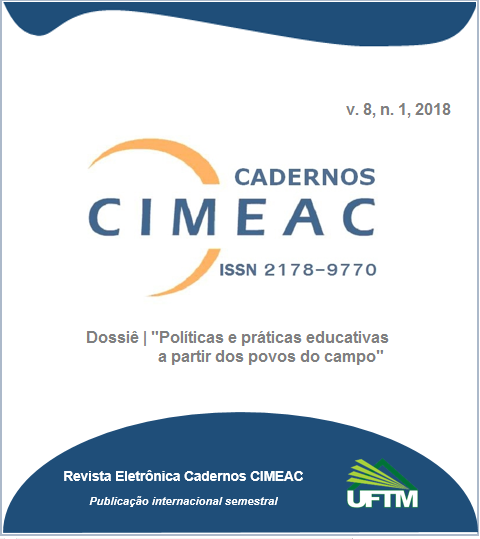Modelagem matemática na educação do campo: visibilidade de saberes locais / Mathematical modeling in rural education: visibility of local knowledge
DOI:
https://doi.org/10.18554/cimeac.v8i1.2850Resumo
O presente artigo tem por objetivo dar visibilidade a uma das formas que uma agricultora que vive no/do campo, no sul do Estado de Santa Catarina, lida matematicamente com o mundo, a partir de uma atividade de Modelagem Matemática, e, posteriormente, mostrar outra possibilidade de lidar com a situação, a partir das lentes da Matemática Escolar. Para tanto, conversei com uma agricultora sobre uma de suas práticas para o desenvolvimento da nossa atividade, que teve por objetivo analisar se “vale a pena criar galinhas para o consumo?”. O relato da atividade de Modelagem Matemática, a partir dos saberes locais, dão visibilidade às singularidades do campo e mostram que a escola não é o único espaço educativo. Ainda, ao olhar para as práticas dos sujeitos do campo, e entendê-las a partir de suas formas de lidar matematicamente com o mundo, evidencia a existência de diferentes racionalidades matemáticas, que estão, intrinsecamente, ligadas à cultura de cada povo.
Palavras-chave: Modelagem Matemática na Educação do Campo; Saberes Locais. Matemática Escolar; Sujeitos do Campo; Racionalidades Matemáticas.
ABSTRACT: The objective of the present study was to promote visibility to one of the ways in which a farmer who lives in/from a rural area, in the southern state of Santa Catarina, deals mathematically with the world, using Mathematical Modeling. The study then aimed to show a possibility of dealing with the situation from the perspective of School Mathematics. In order to achieve this goal, the author talked to a farmer about one of the practices she employed to develop our activity, with the objective of assessing “is it worth breeding chicken for consumption?”. The Mathematical Modeling report, based on local knowledge, promotes visibility to the singularities of the rural area and shows that the school environment is not the only educational space available. In addition, analyzing practices of subjects from rural areas and understanding their way to mathematically deal with the world demonstrates the existence of various mathematical rationalities that are intrinsically linked to the culture of each people.
Keywords: Mathematical Modeling in Rural Education; Local Knowledge; Subjects from Rural Areas; Mathematical Rationalities.
Downloads
Publicado
Edição
Seção
Licença
Os autores que publicam nesta revista concordam com os seguintes termos:
(a) Não cobramos dos autores para a publicação neste periódico.
(b) Autores mantém os direitos autorais e concedem à revista o direito de primeira publicação, com o trabalho simultaneamente licenciado sob a Licença Creative Commons que permite o compartilhamento do trabalho com reconhecimento da autoria e publicação inicial nesta revista.
(c) Autores têm permissão e são estimulados a difundir e a distribuir a versão publicada de seu trabalho online (ex.: em repositórios institucionais ou na sua página pessoal) após o processo editorial, já que isso pode aumentar o impacto e a citação do trabalho publicado (Veja O Efeito do Acesso Livre).
* * *
AUTHORS COPYRIGHT AND PUBLISHING RIGHTS
Authors who publish with this journal agree to the following terms:
(a) This journal does not charge authors for publication.
(b) Authors retain copyright and grant the journal right of first publication with the work simultaneously licensed under a Creative Commons Attribution License that allows others to share the work with an acknowledgement of the work's authorship and initial publication in this journal.
(c) For authors whose articles have been accepted: authors are permitted and encouraged to post their work online (e.g., in institutional repositories or on their website) after the publication of the text in Cadernos CIMEAC, as it can lead to productive exchanges as well as earlier and greater citation of published work (See The Effect of Open Access).


 10.18554/cimeac
10.18554/cimeac


